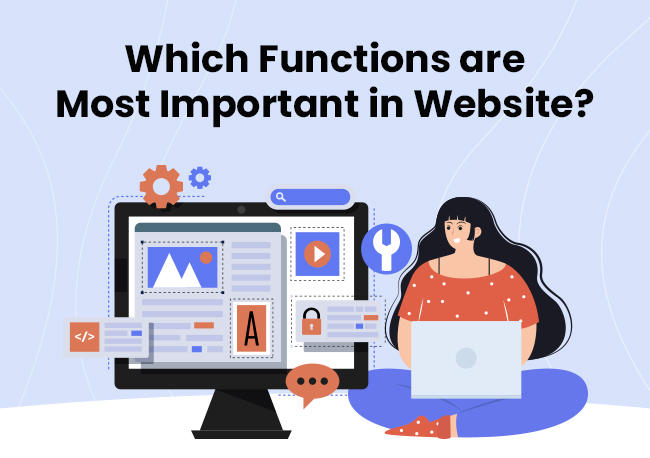Whether you look at big businesses, or really small-scale set-ups; all kinds of revenue-generating machinery is equipped with a website (maybe even multiple). And even creative hobbyists and educators have lately taken to owning websites to pursue and propagate their works. There are about 2 billion websites on the internet now… surely would’ve crossed the mark by the time this article reached you….
But Why Do I Need a Website?
Websites today serve a multitude of productive purposes that businesses cannot thrive without. They help optimize your business while decreasing costs in every imaginably possible way. From a cheap and effective marketing tool to a complexly structured e-commerce mechanism that makes the flow of your business butter-smooth, a website can take on many appearances!

But THE reason your business needs a website is to demonstrate that you are credible. A website forms the cornerstone of your Business’s Social Structure, its Brand Value, its Legitimacy….your Legitimacy.
Prospects google you to measure you up through your website the moment they consider you, customers will try to get to know more about you before they make a purchase, they may even want to communicate with you through your site, stakeholders will check the ins and outs of your business website and your services before they invest into you. You will miss out on a lot without a good website.
ALSO READ: Am I At Loss Without A Website?
But Wouldn’t a Website Cost Too Much?
There are websites that are complex and massive. But if you are worried about the costs while starting your first website, you definitely are not looking for something big or complex.

A good website that serves your functions well will only cost you between INR 10000 to INR 40000 depending on your business goals.
ALSO READ: How To Set A Budget For Your Business Website Development
So, What All Do You Need to Start a Website?
We have arranged a New website launch checklist to make your hunt easier:
Firstly, Register a domain
A Domain is, simply put, the “nametag” of your website’s “location”. It will be whatever goes between the “www.” and the “.com” or some other extension. Like so: www.domainname.com

You can easily register your domain name through any of the domain registrars, we highly recommend you go for one that also hosts your website.
Do note that you cannot register a domain name that is already held by someone else, so take some time to create your unique domain name that is easy to remember.
You should also look into starting your business’s social media page if you haven’t yet as that will not only enhance your website’s Search Engine Visibility, it will also help you connect with your audience better. It will help build trust and be a great marketing tool for your services.
ALSO READ: Top 13 Techniques To Find Creative Domain Names For Your Business.
Research Competitors
Learn how your competitors are doing it, as that will give you insights about your industry’s web trends. Appreciate what they’re doing right, learn from what they’re doing wrong, become aware of what people like/dislike about their products/services, get inspiration.
Look at how their website looks, how it feels from a customer’s perspective, what you would like your site to have, or not have, learn.
Market Research
Formulate an image of your ideal customer(s). Try to answer questions like: – Is my product best suited for men or women, or if it is for all genders? – Where do my customers belong in terms of geography?
➢ How do they usually find out about my business? (Social Media, Search, Word of Mouth?)
➢ In what age range does my ideal customer belong?
➢ What is their line of work, and how much do they make?
➢ Is my product somehow related to their work?
➢ Whether or not they are married, and do they have kids?
➢ Do they have any interests or hobbies?
➢ What challenges do they face that my products/services can solve? – What is important to them?
This customer persona will be the backbone of all your Marketing and help you understand what kind of language you should use, what sort of content would be suitable, etc.
The Perfect Interface
The most important aspect of a website is its User Interface, as it dictates how the User Experience with your site will be.
Plan a perfect interface for your website!
Keep the interface super simple – easy to understand and minimal. Ensure that everything on the interface is purposeful towards serving your web visitor. Make your contact details, address if you own a physical store (add a map too), your social media very easy to access. Use colors tactically. For example, you want to have clickable objects in easy to perceive, contrasting colors. Limit to using two, maybe three colors at the most.
Content Strategy
The content on your website should ATTRACT, ENGAGE, and EDUCATE your prospects and help them OVERCOME their problems. It should answer the “How” and the “Why” questions.
i.e., How your product/service offers value to the customer, and Why they should pick your product/service over the multitude of others on offer.
Make sure you address all your customer personae, and prepare your content strategy accordingly. Your content should be easy to consume and relatable to your audience.
Choosing the Right Hosting Company:
A website is a virtual space that is stored in actual physical computing hardware that is connected to the internet. This is known as “web hosting”. You cannot run your website without web-hosting. There are many web hosting providers that will host your website for you for as low as 80 INR per month.
ALSO READ: 5 Things Small Business Should Know About Web Hosting
SEO Strategy
Search Engine Optimization or SEO is the process of strategically optimizing your content for it to be easily identified for relevant searches by the Search Engine. Like how you may have used: “Website Design” as keywords for the search that led you here, or perhaps a bunch of words, like: “How to create a website from scratch?” [long-tail keyword]; keywords are what help the engine pick your content for the results page.
Use keyword research tools (Google’s Keyword Planner, Whatsmyserp, etc.) and SEO tools (likes of RankmathSEO, and even SEO plugins on your backend are a good investment) for better SEO. Prepare a good SEO Strategy. Make sure that you do not abnormally overuse keywords in your content (keyword stuffing) and keep it natural to read.
Website Development
There are various platforms with ready to use website templates (CMS) for you to start with development, whether a portfolio website to showcase your work, or a website that’s equipped for e-commerce…
Technology has evolved quite a lot, but template-based web design has not reached its pinnacle just yet. While those templates may work exceptionally well for one business, they may turn out to be an utter disaster for the other.
Always seek credible professional advice before you invest in web development.
Website Security
Okay, this one’s crucial. You need to ensure that your site is super-secure.
Get ready with the website security that is fool-proof!
SSL or Secure Sockets Layer protocol encrypts your connection so that there are no data leaks during transfer between your customers and you. TLS or Transport Layer Security is SSL’s successor, which is a cryptographic protocol designed to provide better security against data leaks. So get a TLS, or at least an SSL certificate for your site.
Either SSL or TLS is combined with the good-ol’ http (Hypertext Transfer Protocol) to form a https (Hypertext Transfer Protocol Secure) to encrypt communications and a secure ID.
Do not overlook setting good passwords, and always keep your software updated.
ALSO READ: 9 Types Of SSL Certificates – Make The Right Choice
Select your CMS
If you’re reading this article, there is a good chance that you lack the technical know-how of content publishing and management over your own little piece of the web. A good Content Management System (CMS) comes in handy for you to manage your website. WordPress, Shopify (e-Commerce + CMS), Joomla, and Drupal are good examples.
You can also research your competitors or websites that you admire to check what CMS they are using. To find out which CMS a website is using, many of the best website CMS detector tools can help identify the platform quickly, saving time and effort.
One CMS may be good for one thing, and some will be good for others. So take your time to do your research, and select the CMS you require to use.
ALSO READ: Complete Guide To The Content Management System
Google Analytics & Tag Manager Setup
Website tags are used to gather data about the people who visit your site and their on-site behavior. It is a small piece of code (javascript tags/pixels) that collects information. Google Analytics is a set of tools offered by Google to help you analyze your analytical website data.
You need to add the Google Analytics Tracking Code to the code of your website in order to access Google Analytical Reports. To do this you may get professional help, or if are using a CMS, it might have built-in mechanisms (or supported plugins) that automatically send data to Google Analytics.
Although these mechanisms are quite off-the-rack, and will not be tailored to your exact Needs. That’s where Google Tag Manager can help you. It helps manage website tags, including Google Analytics tracking code, without a need to edit your website code. So you need to set up Google Analytics and Google Tag Manager for good insights.
Conclusion
Ensure that your website is smooth (mobile-phone compatible, and quick to load – you may use Google’s PageSpeed Insights and mobile-friendly test. Now you have your own website that tells the world who you are and what you do, and maybe also help you do it.
It is time for you to publish your first piece of content.
You will learn what works and what doesn’t as you grow, and slowly make your SEO and Marketing game better, even learn how you can serve your audience better as you go…with this little virtual space that’s your own website.
To new learnings and growth!




